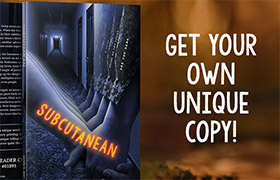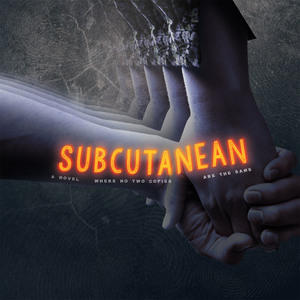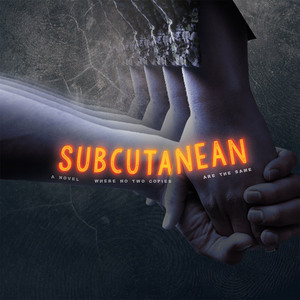But first we had to solve what Niko called the Mere Paradox. He threw a spoon at me when I said this back to him.
“No, smart-ass. A Mirror Paradox. We’re obviously in this creepy weird sync with them.” We were in his room with the door shut, and he was pacing the two-and-a-half steps of cleared floor while I lay on his bed, thinking. “Example. Me and the other Niko both went exploring on the same night. The other side, the other house, they were having a party that night too. We both saw that. The decor, uh, such as it was, was the same on both sides, or close enough. He and I were so synced up that we got to the fridge only minutes apart. He beat me, so he came through first, and then we passed in the hall.” He stopped pacing, shuddered, and drummed his fingers absently on a bulky MIDI keyboard propped up against a wall gathering dust. “Two. A week later, both pairs of us end up getting drunk off vodka on the same night. Oh, there’s these little differences—one side finishes the bottle, the other doesn’t, and this me didn’t get a certain text message that night—but both versions of you decide to go exploring. Again, you get to the pool room only minutes apart. For the most part it’s like we’re staying in a kind of lockstep, despite the superficial differences.”
“Your conclusion, professor.”
“If we go down to explore, they will too. We meet in the middle, and bam.” He shook his head. “Exactly what we don’t want to happen.” He saw I was still confused, so he scribbled two arrows on his whiteboard, pointed right at each other. “The fridge is the connection point. The only way each pair of us can get back, so far as we know. But if we go back there, so will they. It’s like we’re trapped on two sides of a mirror. We each want to touch it, but we can’t do it at the same time.”
“Would it really be so bad?”
He glared down at me. “You don’t trust that feeling? I got a lot closer than you, and man, it was the worst. I don’t know what was causing it or why, but every part of my body was screaming something was wrong, was sick, was going to harm me.” He sighed and flopped down next to me. “So meeting ourselves is out. No choosing between having to fuck or fight yourself.”
“Which would you do?”
“I would definitely fuck myself,” he said solemnly. “You?”
I wrinkled my nose. “Ugh. Neither. I think both of us would take one look at each other and back away in mortified embarrassment.”
“Sounds about right. So if we can’t get close to each other, but trying to cross through will bring us together, then what do we do?”
“Okay, so we explore at random.” I sat up. “Every branch, we roll dice. Even if the others are in sync and pick the same time to explore, they’ll go down different paths.”
He shook his head. “I think the lockstep runs deeper than that. Even randomness could be part of it. The coffee stain. Remember? We both passed the one on this side, coming out. That’s what made you assume you were in the same place. Because it was identical, right? If both versions of me spilled coffee and both made exactly the same stain, I bet dice would fall the same way too.”
“How do we know it’s identical? Did you really stop and look that close?”
That got him. Niko would jump off a bridge to win an argument. A few minutes later we were headed back down the stairs, keeping up a forced light banter. It helped that the coffee stain was close to the surface, and far enough away from the fridge that even if the others went down at the same time, to look at their stain, we’d be nowhere near each other.
No one had cleaned up after the party—in fact, the other housemates had stopped coming down here at all, inexplicably—so there were still Christmas lights and red plastic cups strewn around the big room. Weirdly comforting. We retraced our first trip through the upper hallways to the coffee stain, and got down on hands and knees to study it. I immediately felt foolish.
“This won’t prove anything. We never looked at the original this close.” I shrugged. “I don’t know. It looks the same to me.”
“But exactly the same?” Niko bent closer, excited. “No, I don’t think so. I don’t remember this trail of droplets off to the side here. Do you?”
We argued about it for a few minutes, but it was like grabbing soap in a bathtub. I’d read enough textbooks about memory and perception to know neither of us could accurately recall specifics of the other stain—it was weeks since we’d seen it and the details hadn’t seemed important at the time.
I got up, shaking my head. “What is this even meant to prove? Does it matter if they’re identical or not?”
“It matters,” he said emphatically, “because if it’s exactly the same then the two sides are in total lockstep. We can’t do anything different from them and they can’t do anything different from us. But if the stains are different—even just a little—then there’s a chance to break out of the pattern. Do something unique. That could be huge.”
“But we already know we’re not exactly in sync,” I said. “For one thing, they somehow found keys down here. We never did that. And now they’ve got them both, and we don’t have any. We’d be factoring them into our plans if we had them, right? So they must be doing that right now. Shit, man, they could come through the fridge if they wanted to, any time they want.” We both stopped at this, momentarily chilled.
“So why haven’t they?” he said. “I mean, if we want to get back to the right side, they must too. Why haven’t they come through and given one key back to us?”
“Maybe they know something we don’t,” I said, tired. “Like where they found them in the first place.”
We sat in the hall for a minute in glum silence. I stared at the coffee stain, like it was an inkblot that would resolve into something sensible if I could just make my mind work the right way.
“There’s other differences,” I finally said. “When I went down, I felt like something was wrong, and I went and hid like a baby. The other version of me didn’t do that. We did different things.”
“Yeah,” he said, closing his eyes. “I’m actually worried about that.”
“You were just saying you wanted us to be unique.”
He rubbed his forehead. Maybe he was getting another headache. “The two sides are nearly identical, as far as we can tell. The two versions of us are nearly identical too. So far, at least. But I don’t know. Maybe if we start acting different, if we diverge too far...”
“What?”
He shrugged. “Don’t know. Just a thought. Probably garbage, never mind.”
I closed my eyes and leaned my head back against the wall.
***
Niko was scared. He stayed close to me, almost all the time, hanging out in my room, by the TV, wherever I was. This was a familiar pattern, actually: whenever he got overwhelmed he made me his full-time validator, babbling his interior monologue, running every decision big and small by me, ending most sentences with “Right?” or “Yeah?” It was like outsourcing his ego. I let him do it, like I always did, because it felt good to have him need me that much. But I felt guilty, too, because it couldn’t be healthy.
We kept talking, and eventually our half-assed theories crystallized into a plan.
We rounded up a bunch of dice, some tarot and playing cards, loose change, a dreidel, and a stack of books, and devised a procedure—a ridiculously complicated procedure lasting almost an hour—to end up with two numbers, after several dozen iterations: the first between one and twenty-four, and the second between one and sixty. An hour, and a minute. The theory was that even if both sides were so close even randomness tended to turn out the same, if we stacked that randomness on top of itself, compounding chance on chance, it might be a wedge to split that sameness apart. Niko showed me a tiny video on his computer about strange attractors, said this was chaos theory in action, the butterfly effect. Whatever. We were making wild guesses.
But the hope was that even if the other versions of us were doing the exact same thing—following an identical procedure—their numbers would drift apart and they’d end up generating a completely different time.
Which would allow us to leave something for each other at a rendezvous point.
“The fridge is the natural spot,” he said, “Right in the middle. Maybe they’ll give us back our key. Or leave a note with a better plan.”
We weren’t sure what we could offer in return. Eventually we decided on a message. I had a carbon paper memo pad from my dad’s old office: kind of a memento, but I wasn’t feeling nostalgic. We could leave a handwritten note and keep a copy.
So we had a plan. We just needed a time, and something to say.
***
“In hindsight,” Niko said, throwing back the last of the coffee and smacking his lips, “maybe we should have put a range on the fucking numbers. Dear God. I have to be at work in five hours.”
It was just after three in the morning, and we were prepping to go down. The time we’d generated was 3:41. We hoped for their sake the guys on the other side got something more reasonable.
Niko was in a rough mood, and it wasn’t just the time of day. His old jock friends had been ragging him the day before about not hanging out. (“I have to pretend sports bloopers are funny, Ry. It’s horrible.”) Later he’d gotten a call from one or both of his parents about how his degree was progressing, which had apparently not gone well. He spent the rest of the day in his room with the door shut blaring loud music and, apparently, watching a Friends marathon. Every time I listened at his door I kept hearing Joey say “How you doin’?” Laugh track. Maybe he was just watching the same episode on repeat. Late that night I knocked again and reminded him we had a three a.m. date. A long and mournful stream of cuss words came muffled through the door. After an ominous silence he opened it, looking bleak. “Whose stupid idea was this again?” he asked, then grimly set his alarm.
We’d planned a quick trip in and out, to minimize the chance of overlapping times. When we got to the kitchen, we’d leave the note in front of the fridge (since we couldn’t actually open it ourselves) and immediately head back. If their time was earlier than ours, their message would already be there waiting, possibly with the key if they were feeling generous; if not, we’d come back the next day at some convenient time to check again. It all made sense, expect we were making it all up and had no idea if any of this would work or if we were just playing make-believe.
Swinging up the bed did feel ominous now, though. I noticed for the first time that it creaked. Stupid. We were girded up with supplies even though it was supposed to be a quick trip—three flashlights each, water bottles, even granola bars.
We’d never seen anything dangerous down there, exactly. We just knew something wasn’t right, now. That it wasn’t just a basement down there.
We knew. We knew nothing. The truth is that despite our attempts to rationalize, to explain, we were blind. Shooting in the dark. Grasping at straws from sci-fi movies and bad dreams.
We had no idea what was happening to us.
We headed down, quietly so as not to wake our housemates. Once we got Downstairs, we followed the well-beaten path toward the room with the pool and the fridge. Niko was jumpy, especially when we got to the first staircase into the dark zone. Every shadow seemed ominous and he muttered suspiciously at everything. “I think this door moved,” or, “Someone’s been here, I can feel it.” I tried my best to keep things light, to reassure him.
On our way down the twisting stairs to the octagon room, he stopped at one landing and glanced down the hall branching off from it. With a choke, he stiffened and leapt back, gripping the flashlight like a sword.
“Jesus fucking Christ,” he hissed. “What the hell is that?”
This is just one way the story can go. In the final version of Subcutanean, no two stories will ever be quite the same. Find out more at https://igg.me/at/subcutanean












Comments (0)
See all